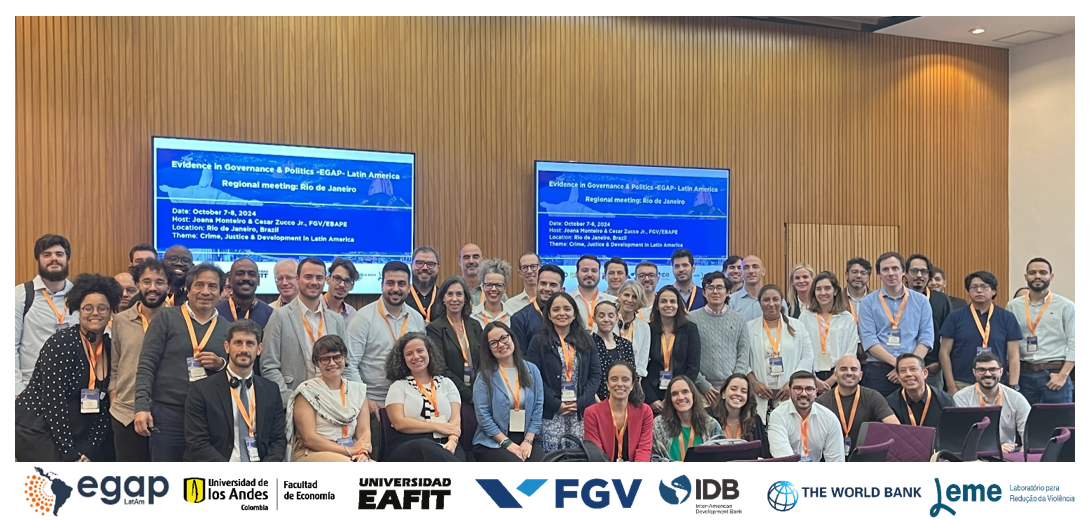EGAP Latin America Hub’s 2024 Regional Meeting in Review: Rio de Janeiro, October 2024
In early October 2024, EGAP’s Latin America Hub held its Second Regional Meeting. This event brought together leaders in academia, policy, and practice to tackle pressing issues around Crime & Justice in Latin America. This two-day event, held at the Brazilian School of Public and Business Administration at Fundação Getulio Vargas (FGV/EBAPE) in Rio de Janeiro, was a collaborative effort with the Inter-American Development Bank (IDB).
The meeting was co-hosted by Joana Monteiro and Cesar Zucco Jr. (FGV/EBAPE) alongside Santiago Pérez-Vincent (IDB), Regional Hub Directors Directors Leopoldo Fergusson (Universidad de los Andes) and Santiago Tobón (Universidad EAFIT). The meeting united an interdisciplinary network of leaders ready to drive impactful change.
The first day featured a series of insightful plenaries:
- Accents as social capital in Colombia: Leopoldo Fergusson explored how accents shape societal perceptions, offering a powerful lens into the interplay of language, class, and inequality.
- Ethical challenges in field experiments: Raúl Pacheco-Vega highlighted ethical concerns in organized crime research, advocating for a balanced integration of ethnography and experimental methods.
- Human capital investments during wartime: Lelys Dinarte’s session on Ukraine highlighted the resilience of education systems under conflict and their role in post-conflict recovery.
- A New Path to Police Reform? Michael Weintraub explored the effects of a new police squad in Ceará, Brazil, showcasing innovative law enforcement strategies to reduce crime and enhance community trust.
Beyond these sessions, six feedback sessions allowed researchers to refine their research projects on topics such as illegal mining, migration, labor inspections, informality in microenterprises, and public perceptions of parapolice groups. The first day concluded with a group dinner, providing participants the opportunity to network and further the discussions sparked during the sessions.
The second day began with the IDB’s session on Organized Criminal Groups Conceptual Framework, presented by Santiago Pérez-Vincent. The discussions then included innovative approaches to measuring and addressing organized crime, featuring case studies showcasing innovative data initiatives from across Latin America. Case studies included:
- Maria Micaela Sviatschi‘s session on criminal activities in El Salvador and their socio-economic impacts, offering valuable insights into how these activities shape the country’s development landscape.
- Santiago Tobón shared data-driven initiatives in Medellín, demonstrating how localized research can generate actionable insights for policymakers and community leaders.
- Joana Monteiro presented efforts from Rio de Janeiro, highlighting how city-specific strategies can inform broader policy frameworks to combat organized crime.
- Fernanda Sobrino introduced data initiatives for measuring criminal groups in Mexico, focusing on tools and methods to inform criminal group mapping.
- Pedro Diogo and Claudio González concluded with a session on data initiatives for Brazil and Chile, emphasizing the importance of cross-country collaboration in addressing regional challenges.
The event culminated in a plenary debate on key gaps and opportunities for advancing methodologies, chaired by Joana Monteiro and Ernesto Schargrodsky. This interactive discussion brought together diverse perspectives to identify innovative research directions and collaborative strategies.
The meeting underscored the importance of collaboration in tackling the region’s complex challenges of crime and justice. As participants left with strengthened networks and innovative insights, the event reaffirmed EGAP’s commitment to impactful research and informed policymaking.
We extend our heartfelt thanks to all participants, hosts, and supporters who made this event possible!
Interested in learning more? Check out the full list of meeting participants here.

